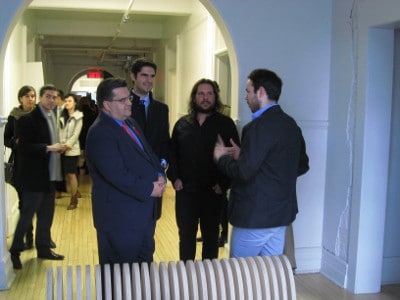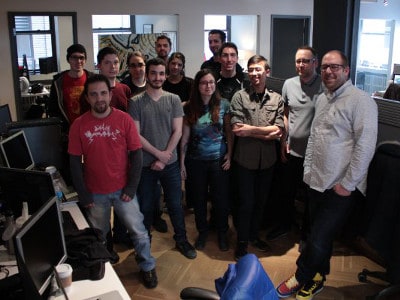

Approximately 150 and 200 start-ups in Montreal and Toronto, respectively, participated in a simultaneous Start-Up Open House event last week.
In Montreal, the event saw participation from Frank & Oak, Provender, Shopify and Uber, with a visit from mayor Denis Coderre at start-up community hub Notman House.
Cantech Letter chatted with Busbud‘s Louis-Philippe Maurice at Notman house, immediately before the mayor’s arrival.
“It’s a distributed open house, that happens in hundreds of start-ups at the same time,” said Maurice. “So far, we have about 5,000 people signed up total. And the goal is to let start-ups connect with future talent and also the general public. Because often times, start-ups are working on their own thing, kind of in the shadows. Here, there’s an opportunity to connect directly our teams with people who are buying our products or who are maybe actually working with us, as well.”
LP Maurice makes clear that the question of public outreach and engagement is important, simply because even the very big names of start-up culture are basically unknown to the general public.
“All of us know Hootsuite, all of us know Shopify, all of us know Frank & Oak,” he says. “But the people out there, they don’t really know about these companies. So the idea is working together collaboratively, which is one of the key tenets of start-up culture, and helping each other out.”
“There’s a lot of amazing start-ups that go under the radar 365 days a year. They’re really trying to change the world, in a good way.” Busbud CEO Louis-Philippe Maurice
Director of Platform for Real Ventures, Gabriel Sundaram, also in conversation with Cantech Letter at the Notman House event, elaborates that even though start-up culture represents a loose coalition of small companies, the numbers add up impressively.
“It’s very interesting when you start comparing the numbers in aggregate,” says Sundaram. “When you think of a big company, like a CGI or Bell, you think about all the people that are employed with that one company. When you start to group start-ups together, the numbers get really interesting. Just with the companies that are participating in Montreal alone, I think there must be over 500 open job positions.”
So aside from being an opportunity for public outreach and promotion, the Start-Up Open House is also a job fair disguised as a party.
While a distributed network of small companies remains a defining feature of start-up culture in general, LP Maurice tells me that a mature ecosystem is dependent on at least one of those companies breaking out big-time. While Vancouver has Hootsuite and Vision Critical, and Ottawa has Shopify, Maurice frankly states that in Montreal, “there’s a big gap between large companies and start-ups.”

“We need anchor companies,” he says. “When you hear politicians and senior business leaders, they always talk about the same handful of companies. In Quebec, it’s Cirque du Soleil, which is 30 this year, Bombardier, which is more than 50 years old. I think what we want is to have some more names as part of this conversation. Like Frank & Oak, for example.”
The rise of start-up culture since the 2008 financial meltdown has meant a diffusion, too, of venture capital and entrepreneurial hubs spread throughout North America, no longer solely in Silicon Valley, although the Valley remains its natural epicentre.
LP Maurice’s own journey closely mirrors the phenomenon of what AOL co-founder Steve Case calls “the rise of the rest”, with entrepreneurs actively promoting their own local scenes, rather than chasing Valley money.
After working in Silicon Valley for several years, Maurice trekked back to Montreal to start Busbud, a company that helps bus travellers plan itineraries, which would have been borderline impossible in the years prior to start-up culture’s rise.
Having successfully led Busbud for three years, Maurice is aware that Montreal’s anchor companies are still out there, waiting to be found. Diverting attention from his own success is part of what the Start-Up Open House is about.
“There’s a lot of amazing start-ups that go under the radar 365 days a year,” he says. “We’re pretty lucky at Busbud. We get a lot of attention from the community. We give a lot back, as well. But a lot of start-ups should be discovered tonight by people. I want a few people to be hired, to bring their CVs and just work for these companies. They’re really trying to change the world, in a good way.”

“There’s not really an industry group that organizes to promote start-ups as a community thing,” adds Gabriel Sundaram. “It’s a new phenomenon, as well. Two years ago, there were probably half the number of start-ups there are now. So it’s really great to see what’s happened in such a short period of time.”
Mayor Denis Coderre’s enthusiastic participation in the Open House is consistent with his stated aim of making Montreal a “smart” city, with technology enhancing aspects of daily urban life such as public transportation, city services and citizen engagement.
As for Toronto, it’s a little early to evaluate their newly elected mayor’s attitude to start-up culture. But it can only be an improvement on the previous mayor’s agenda, which no one ever described as “smart” in any sense.
We couldn’t help wondering, though, with Uber participating in the Montreal Open House, how mayor Coderre’s comments regarding the grey-market taxi industry disruptor earlier in the week may have played for the event’s organizers.
UberX, which started operation in Montreal only days earlier, is “illegal”, said the mayor.
If Coderre’s problem with Uber turns out to be that drivers ought to be required to have the same type of permits and commercial driver’s licenses as taxi operators, then surely he must also crack down on Airbnb, through which anyone can advertise their living space as a short-term rental, without adhering to any of the regulatory demands placed on B&Bs and hotels.
This tension between the ambitions of start-up culture and the establishment might be healthy, if a politician like Coderre, who makes all the right speeches regarding technology and entrepreneurship, decided to accept that the intention of sharing economy services like Uber and Airbnb aren’t malicious, but productive examples of how start-up culture, at its best, opportunistically seeks to improve the day-to-day problems of urban life.
That said, the fact that Coderre is already a Start-Up Open House cheerleader should be a solid indication that the event isn’t mainly about flouting authority, but promoting links between Toronto and Montreal’s rising tech hotbeds.
Leave a Reply
You must be logged in to post a comment.





 Share
Share Tweet
Tweet Share
Share




Comment